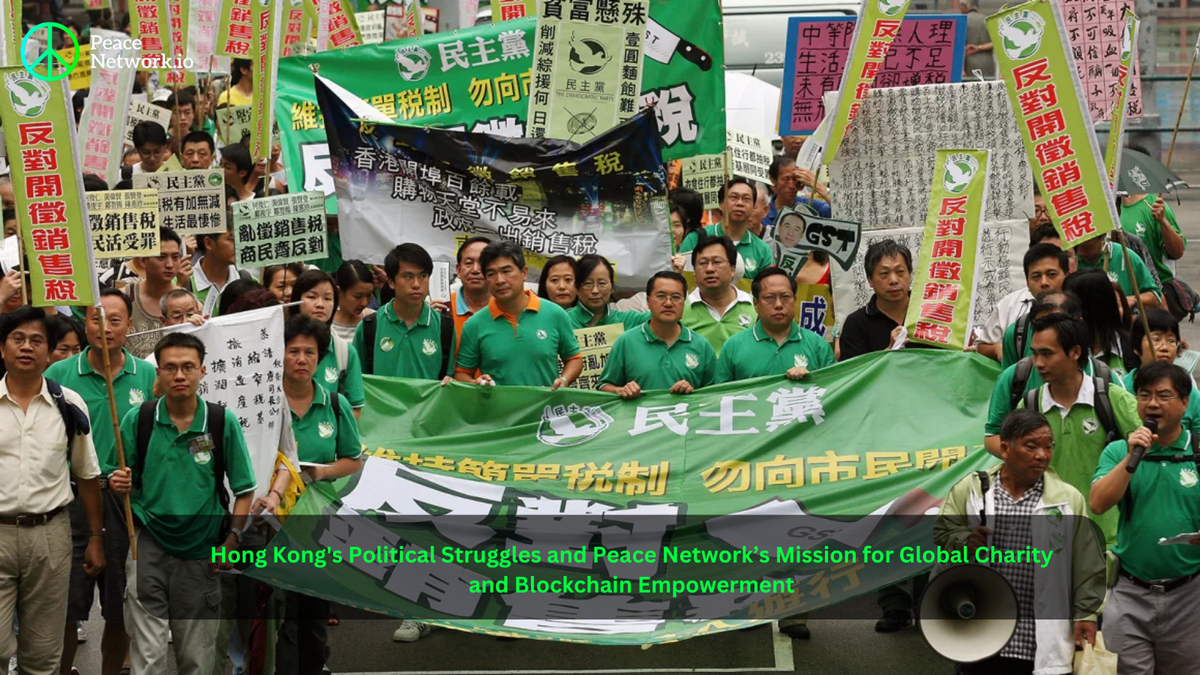Hong Kong's Political Struggles and Peace Network’s Mission for Global Charity and Blockchain Empowerment

A Turning Point in Hong Kong: The Democratic Party's Dissolution
Once the face of peaceful resistance and electoral advocacy in Hong Kong, the Democratic Party is now on the verge of dissolution. Founded in 1994, it was more than a political entity—it was a symbol of Hong Kong's once-vibrant civil society. For years, the party championed democratic values, universal suffrage, workers’ rights, and environmental justice.
But those values are under siege.
Democratic Party chairman Lo Kin-hei, left, and Mok Kin-shing, vice chairman, speak at a press conference at the party's office in Hong Kong on April 13, 2025
Since the 2019 protests and the 2020 introduction of Beijing's national security law, Hong Kong’s political ecosystem has undergone a seismic shift. The "patriots-only" electoral framework, mass arrests of opposition figures, and a chilling crackdown on dissent have created a new reality: one where political participation outside the central government's favor is not just discouraged, but criminalized.
In this climate, the Democratic Party faced relentless pressure—from both state-aligned media and government channels. With dwindling membership, lack of electoral viability, and continued state surveillance, the party began the process of disbanding. It wasn’t just a political decision—it was the final breath of an era where peaceful opposition had a legitimate place in Hong Kong.
A Diminished Future for Civil Society
The party’s dissolution is emblematic of a broader crisis. Civic organizations, independent media, and NGOs have all faced varying degrees of repression. Hong Kong, once a regional hub for global civil society, is increasingly closing its doors to public dissent and grassroots participation.
In times like these, when political freedoms are squeezed, it’s often humanitarian and charitable efforts that pick up the slack—quietly addressing urgent needs while offering a flicker of hope beyond politics.
Democratic Party candidates for legislative elections show thank-you messages outside the legislature in Hong Kong on September 17, 2004
The Role of Peace Network: Simple, Yet Powerful
Peace Network does not claim to be a political actor. But in regions facing repression, conflict, or disaster, its presence becomes quietly powerful. Founded on the principles of peace, love, and transparency, the organization leverages blockchain technology to offer humanitarian assistance in places where traditional aid channels falter.
While Peace Network’s primary operations are not focused in Hong Kong, their broader model presents an important contrast. As governments tighten control, platforms that use decentralized technology provide something increasingly rare: accountability, openness, and the ability for ordinary people to contribute and receive aid across borders.
- Global Reach: Active in over 50 countries and territories.
- Proven Impact: Over 2 million members and volunteers have helped support 65 villages and over 12,000 people in crisis.
- Transparent Tools: Blockchain ensures donations are traceable, aid is delivered directly, and trust is rebuilt in the process.
In a world where political structures are growing more rigid, Peace Network quietly empowers individuals to help one another directly—across nations, across ideologies, and beyond the limits of state control.
Democratic Party lawmaker Roy Kwong Chun-yu addresses crowds at a protest in Hong Kong on June 16, 2019.
Final Reflections: When Civil Space Closes, Global Solidarity Matters More
The situation in Hong Kong is a sobering reminder that rights once taken for granted can disappear swiftly. Political parties can vanish. Journalists can be silenced. Activists can be jailed.
But while repressive systems try to control narratives and extinguish opposition, human connection and compassion find new ways to thrive.
Peace Network is not here to replace politics—but to remind us that even in the darkest moments, decentralized communities, transparency, and global solidarity still matter. When one city’s voice goes quiet, the world must listen more closely, and support must come from wherever it can.
As the story of Hong Kong’s political struggle continues, the global community must not turn away. Whether through technology, charity, or simply choosing to care—each effort helps light the way.

